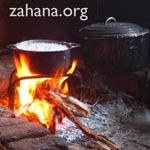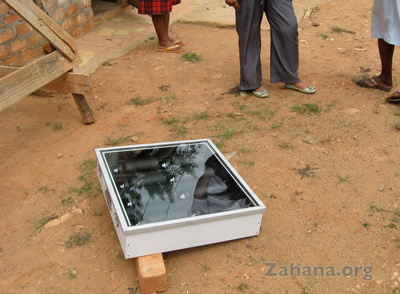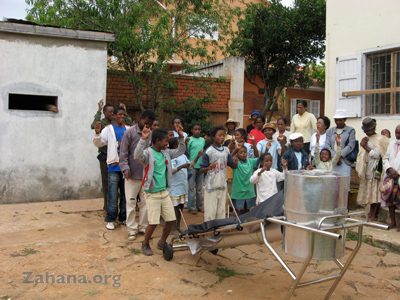BlazingTubeSolarAppliance: a next generation of solar cookers and solar water pasteurizers for Madagascar
 Deforestation, due to the widespread use of charcoal or wood
fired cookstoves,
is a key issue for Madagascar. Solar energy, often suggested, seems ideal,
but introducing such a new technology is challenging. It requires careful,
culturally tailored planning to get the community to accept, adopt and
utilize something like solar cooking.
Deforestation, due to the widespread use of charcoal or wood
fired cookstoves,
is a key issue for Madagascar. Solar energy, often suggested, seems ideal,
but introducing such a new technology is challenging. It requires careful,
culturally tailored planning to get the community to accept, adopt and
utilize something like solar cooking.
Traditionally food, mainly rice, is cooked over open fire in Malagasy villages. Firewood is getting harder and harder to find. Using an improved cookstove can reduce the need for firewood in more than half, but solar cooking could take this a step further.
Introducing a new technology such as solar cooking is a long-term strategy. The need to reduce the need for firewood is more immediate. To address this Zahana developed and promoted an improved cookstove that can be built in a few hours with a few bricks and mud. In the rainy season solar cooking is not a viable option and the improved cookstove, in tandem with reforestation efforts, is a practical immediate solution.
February 2010: Solar cookers
and solar water pasteurizers on thier way to Madagascar
The inventor of the blazingtube solar cooker generously offered by the end of last year to donate a large number of his innovative solar cookers and solar water pasteurizers to Zahana. We are very grateful, and this wonderful donation gives us the opportunity to expand the focus of our activities beyond solar cookers for the school in the future.
In January the first solar cookers and solar water pasteurizers were successfully produced in China. While we were in the process of figuring out the intricacies of shipping to Madagascar the devastating earthquake hit Haiti. With a dire need for water that is safe to drink the inventor decided to donate and ship most of the solar water pasteurizers and solar cookers to Haiti.
But since he is committed to support Zahana as well, a few solar cookers and solar water pasteurizers went en route to Madagascar on a cargo ship. Link to a Hawaii TV newscast about the water pasteurizers (as long as the TV station keeps it hot). To see the BlazingTubeSolarAppliance in action in Namibia, please visit the Solsolidari website


Left: The solar water pasturizer in use on the ground in Madagascar. Right: The Blazingtube solar cooker arrives
March 2010 update: Since then the ship has arrived in Madagascar, but...
The solar water pasteurizers are a huge success. They are met with great interest, and are so efficient that even with limited sunshine water can be made safe to drink within a few hours. The solar water pasteurizers have proven to be an invaluable educational tool to demonstrate the suns energy can be used in many ways. The metal bottles need to reach just 150 degrees C to effectively pasteurize and therefore make water safe to drink. The effect of the suns energy can be experienced "hands on", touching the bottles quickly. The public health benefits in Madagascar for such a low-tech devices will be huge.
The solar cookers have not had the same luck. After an endless customs and shipping saga, with new forms and documents being requested every second day by some other agency, we finally got the boxes. After the boxes were delivered and unpacked, we found out that half of the vacuum tubes were broken "somewhere in transit", with the blame being passed around among the shippers. A huge vacuum tube is not something we can buy in Madagascar off the shelf. Replacing it will take time and we are working with the inventor on our options. The sun has not cooperated either. Rainy and overcast days in the capital have made solar cooking there challenging to date.
We will initially take only two Blazingtube solar cookers, one for each of Zahanas schools, to the villages. With the dry season starting in this part of the country, test data in sunnier Madagascar climate conditions will help us to evaluate the blazingtube on location, where it is needed the most.
To see the BlazingTubeSolarAppliance in action in Namibia, please visit the Solsolidari website
- BlazingTubeSolarAppliance brochure: US letter format (English) high resolution PDF
- BlazingTubeSolarAppliance brochure: A4 format (English) high resolution PDF










